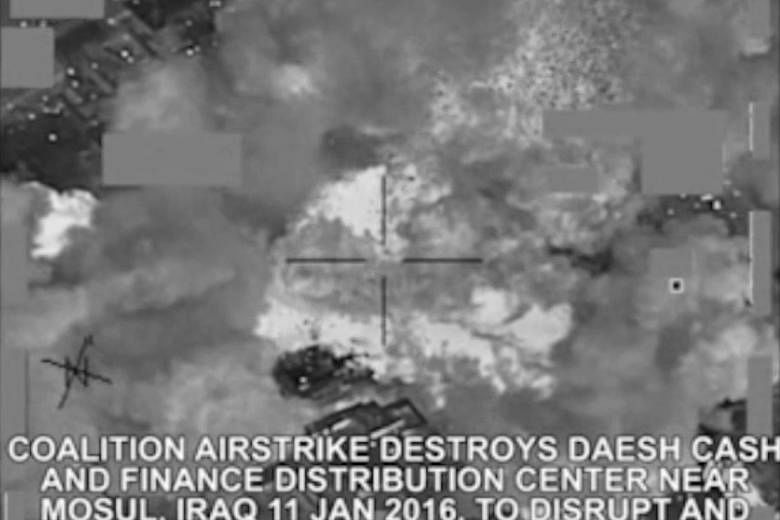WASHINGTON (AFP) - The US-led effort to fight Islamic State in Iraq and Syria (ISIS) militants has a new focus: bomb the "Daesh cash."
Daesh - a widely used Arabic term for the ISIS group - has been hoarding millions of dollars in local currency and greenbacks across Iraq and Syria, much of it derived from illicit oil sales.
Colonel Steve Warren, a Baghdad-based spokesman for the US-led coalition that has been fighting ISIS since August 2014, said nine strikes in Iraq and Syria in recent months have led to the destruction of "tens of millions" of dollars of this money.
"Striking these cash collection points hurts this enemy," Warren told Pentagon reporters in a video call on Wednesday.
"They operate on cash; there is no credit in ISIL," he added, using another alternative name for the extremist group that seized huge regions in Syria and Iraq in 2014 and 2015.
The US military has released videos of air strikes on what it says are cash-collection facilities.
In a video of an attack on a building in Mosul earlier this month, vast plumes of what appears to be money can be seen fluttering into the sky following a huge blast.
A coalition strike hit another cash collection facility in Mosul on Monday, Warren said.
Evidence shows this focus on ISIS cash, combined with the continued bombing of oil trucks that ferry illicit oil around Syria, is hurting the militants' bottom line, Warren said.
He cited press reports saying ISIS leaders have had to cut their fighters' salaries by as much as half.
"A combination of taking away their ability to earn money by striking oil and taking away the money they have on hand by striking the Daesh cash really puts the squeeze on them," Warren said.
Initial estimates are that the number of civilian casualties in the money strikes was less than 10, Warren said.
Under pressure from critics who say the anti-ISIS campaign is moving too slowly, the Pentagon has indicated it is considering a wider array of targets even if these might cause civilian deaths, provided these attacks yield significant gains against the militants.
"One of the burdens of command is to weigh the military value of a target versus the potential for civilian loss of life," Warren said.
"These are tough decisions that commanders have to make."
Pentagon chief Ashton Carter on Wednesday met with defence ministers from several other nations in the anti-ISIS coalition and said the next phase of operations would target the de facto ISIS capital Raqa in Syria, and Mosul in Iraq.

